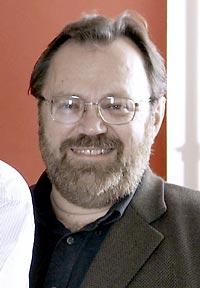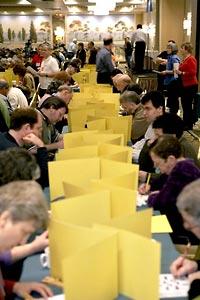Clue: Makes you scratch your head. Answer: Merl Reagle.

Movies that should not be shown together: "Soapdish"/ "Hair." "Driving Miss Daisy"/ "Nuts."
Popular songs that sound like they were written by people in an insane asylum: "I Talk to the Trees." "Raindrops Keep Falling on My Head." "Everyone's Gone to the Moon."
Merl Reagle, a crossword-puzzle constructor featured in the documentary "Wordplay" (opening Friday at the Harvard Exit) is sharing a few of the lists in his head — which are, of course, themes for crossword puzzles.
"The one I've always wanted to use is 'Bananas' and 'Three Men and a Baby,' and the clue is, 'What are the ingredients of a cannibal daiquiri.' " But he's never been able to use it. "Because it's the baby, see. If it were all adults, you could use it. You can't step across a certain line, you'll get mail from people." And off he goes on another list. "Inappropriate Muzak for a doctor's office. Say, 'Killing Me Softly.' You wouldn't want to hear that in a doctor's office.
"Or, somebody once said, 'eye-catching.' I thought, 'eye-catching.' If there were a Stephen King County Fair, eye-catching would have a whole other meaning. So that was an idea for a puzzle. Monster trucks. Countingnoses. You think of common words — put in the right context, they're funny."
Reagle, in town with "Wordplay" director Patrick Creadon for the film's premiere at the Seattle International Film Festival, is a bearded fellow with a wry voice and easy laugh. He's been making puzzles for half a century — he made his first at age 6 — and has, he says, "thousands" of 3-by-5 cards and black books at his Tampa, Fla., home to keep track of all those puzzle ideas.
Syndicated in a number of newspapers (including this one, on Sundays), he sold his first puzzle to The New York Times at 16 and got his first regular Sunday-puzzle gig at the San Francisco Examiner in 1985. As we see in the film, he's old-school: Though he has puzzle-making software, he prefers to plot out his puzzles by hand, usually at a café near his home.
Even crossword devotees will be surprised by the details revealed in "Wordplay," a delightfully quirky documentary that uses as its central figure Will Shortz, editor of the New York Times crossword puzzles since 1993 (the Times puzzle also runs in the Sunday Seattle Times). "Crossword puzzles are symmetrical," says Reagle. "Will says half of crossword solvers haven't noticed that." (Take a crossword puzzle, like the one on page E7, and turn it upside down. See?)
And when certain famous crossword puzzles are revealed in the film, the audience audibly reacts.
"[The film shows] the most amazing puzzle Will has ever seen: the Bob Dole/Bill Clinton puzzle that gets people gasping out loud," says Reagle. That puzzle, made for Election Day 1996, featured as clue 39-Across "Lead story in tomorrow's newspaper." Creator Jeremiah Farrell had constructed the puzzle so that either "BOB DOLE ELECTED" or "CLINTON ELECTED" would fit. This meant crafting clues that could have two correct answers; i.e. 39-Down, "Black Halloween animal," could be either "BAT" or "CAT." Many solvers at the time didn't realize the trick; some contacted Shortz in a fury, asking how he dared presume to predict the winner. (Clinton, by the way, appears in "Wordplay" as one of a number of celebrity crossword-solvers.)
The New York Times crossword puzzle has long been seen as the gold standard in crosswordpuzzledom, and its rules are followed by professional puzzlemakers: a symmetrical grid, no more than 16 percent black squares, no two-letter answers. But the wordplay in such puzzles as the Election Day crossword is a relatively new innovation, brought to the paper by Shortz himself.
As "Wordplay" describes, before 1993 the New York Times crossword emphasized difficult words. Editor Eugene Maleska, for the most part, eschewed pop-culture references, brand names and the kind of playful cleverness that Reagle says was being practiced elsewhere. "Games Magazine, Dell Crossword Champions, Simon &Schuster, all those magazines and books — we'd been doing all kinds of tricky things, multiple letters, rebuses, palindromes, all that stuff in puzzles in those years before 1993," says Reagle.
"If we had our druthers, all the answers would be easy, just the clues would be tricky. So when you solve it, you know you're right all the time. As opposed to, say, 'a Scottish lake,' 'a French river.' " By comparison, a recent Reagle crossword featured the clue "Slanted reporting? (abbr.)" The answer: ITAL. ...
"Crossword puzzles should be like 'Jeopardy!,' " says Reagle. "Old-fashioned crosswords wouldn't have lasted a week on TV. 'OK, name three Philippine trees.' That's not going to be on 'Jeopardy!' "
Upon Maleska's death in 1993, Shortz was hired, and a new era began. A puzzle creator and former Games Magazine editor, he helped organize the first American Crossword Puzzle Tournament and has hosted it annually since. (Much of "Wordplay" is devoted to the 2005 tournament, which was unusually dramatic in its conclusion.) After a turbulent start — "Crossword solvers hate change," says Reagle — Shortz settled in, part of a new generation of crossword people.
"All of us who used to be on the outside in the '80s are now on the inside," says Reagle. He describes, with relish, a crossword called "In a Perfect World," in which all the theme answers had IRS in them, but it was left out, i.e. FIRST BASE was FTBASE.
"Someone asked me, doesn't it bother you that all these great gags are only seen by one-twelfth of the public? ... Well, it's a tradeoff I make for all the pressure. If I were a standup comic or I wrote for sitcoms, I'd be a wreck. I'd be popping pills all the time. Much more relaxing to make a puzzle, send it out there. You know people are laughing, or you hope."
Moira Macdonald: 206-464-2725 or mmacdonald@seattletimes.com
